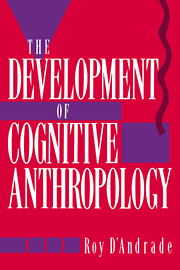Book contents
- Frontmatter
- Contents
- List of figures
- List of tables
- Preface
- 1 Background
- 2 Towards an analysis of meaning
- 3 The classic feature model
- 4 Extension of the feature model
- 5 Folk taxonomies
- 6 The growth of schema theory
- 7 Models and theories
- 8 Cultural representations and psychological processes
- 9 Cognitive processes and personality
- 10 Summing up
- References
- Name index
- General index
2 - Towards an analysis of meaning
Published online by Cambridge University Press: 05 June 2012
- Frontmatter
- Contents
- List of figures
- List of tables
- Preface
- 1 Background
- 2 Towards an analysis of meaning
- 3 The classic feature model
- 4 Extension of the feature model
- 5 Folk taxonomies
- 6 The growth of schema theory
- 7 Models and theories
- 8 Cultural representations and psychological processes
- 9 Cognitive processes and personality
- 10 Summing up
- References
- Name index
- General index
Summary
It is one thing to be interested in the ethnographic study of idea systems. It is another thing to be able to carry out this type of investigation successfully, as Kluckhohn's work with Navaho philosophy indicated. The basic problem revolves around the issue of identification; that is, the development of a method by which an ethnographer can reliably identify cultural ideas, beliefs, or values. At first the issue did not seem particularly problematic. It seemed one could simply interview the people one was studying, and from these interviews determine the native systems of ideas.
Indeed, there had been a number of studies in anthropology which used this approach. Malinowski had interviewed the Trobrianders about their beliefs about magic and religion and Evans-Pritchard had interviewed the Azande about their beliefs about witchcraft, to cite two well-known examples. Such interviewing was sufficient to investigate the specific ideas surrounding a specific set of institutions. However, ordinary interviewing did not get at deeper, more general understandings which were not related to any particular set of cultural practices.
Further, there was a general intuition that cultural systems of ideas consisted of more than just lists of statements. The intuition was that there was something organized and systematic about culturally shared ideas, that they had some kind of structure or form. Note the continual use of the terms “system” and “systematic” in the quote from Beattie in the previous chapter. But what form did these systems have?
- Type
- Chapter
- Information
- The Development of Cognitive Anthropology , pp. 16 - 30Publisher: Cambridge University PressPrint publication year: 1995



